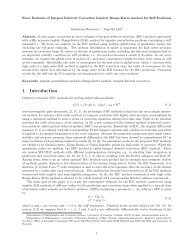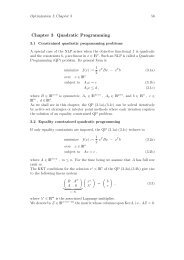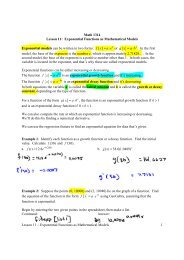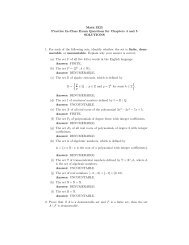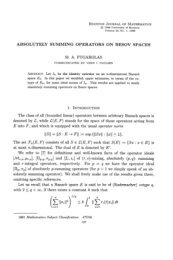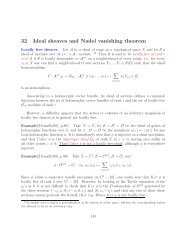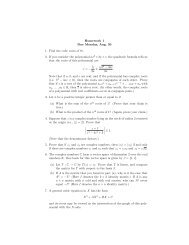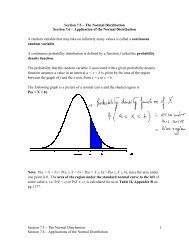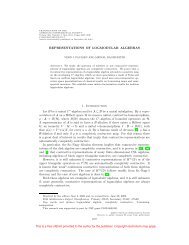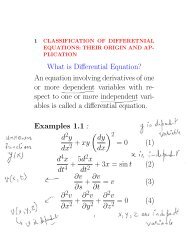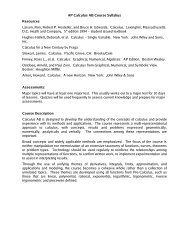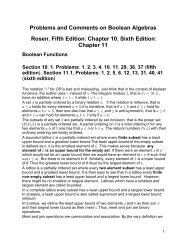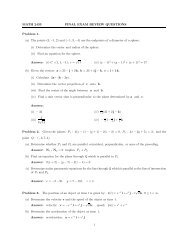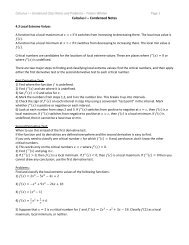Survey 1979: Equational Logic - Department of Mathematics ...
Survey 1979: Equational Logic - Department of Mathematics ...
Survey 1979: Equational Logic - Department of Mathematics ...
Create successful ePaper yourself
Turn your PDF publications into a flip-book with our unique Google optimized e-Paper software.
WALTER TAYLOR 21<br />
9.24. The variety <strong>of</strong> disassociative groupoids (Clark [88]). (The axioms <strong>of</strong> this<br />
theory consist <strong>of</strong> all two-variable consequences <strong>of</strong> the associative law for a single<br />
binary operation. Cf. 14.4 below.)<br />
9.25. The two theories axiomatized by T O and T 1 (<strong>of</strong> Tarski [413] ):<br />
T O = {Fn+lyxl--'XnY = Fn+lyx2 --'xnxly: n C co)<br />
T 1 = T O t_J { Fnyxl--.x n = Fn+lyxl..-xnFyy: n C<br />
(Here F is a binary operation and F n is defined recursively via Fn+lxl--'Xn+2 =<br />
F(Fnx 1" 'Xn+l)Xn+2')<br />
PROBLEM 1. Is the algebras (R, xy,l-x) finitely based? (Here R denotes the real<br />
numbers.) (J. Mycielski [136]; R. McKenzie discovered a non-trivial identity <strong>of</strong> this<br />
algebra - again see [ 136] .)<br />
PROBLEM 2. Is (co, 1,x+y,xy,x y) finitely based? (Tarski) Cf. 9.21 and Problem 2<br />
<strong>of</strong> õ8. For a discussion <strong>of</strong> this problem see Henkin [ 181 ].<br />
PROBLEM 3. Is A finitely based if A is finite and all subdirectly irreducible<br />
algebras in HSP A are in HS A? (B. Jdnsson).<br />
We close with three "problems" which are no longer problems - they were solved<br />
just as final preparations were made on this survey. Pigozzi showed that the answer to<br />
Problem 4 is "no"; his example is actually generated by a finite algebra.<br />
S. V. Polin has answered negatively Problems 5 and 6. His work (see<br />
supplemental bibliography) has been replicated and improved by M. R. Vaughan-Lee.<br />
Their example is a non-associative ring <strong>of</strong> characteristic 2 having 64 elements. Other<br />
examples have since been found by I. V. Lvov, Yu. N. Mal'tsev and V. A. Parfenov.<br />
"PROBLEM" 4. Is every equationally complete (see õ 13 below) locally finite<br />
variety finitely based? (McKenzie [299] ).<br />
"PROBLEM" 5. Is every finite algebra which generates a congruence-permutable<br />
variety finitely based? (McKenzie [299] ).<br />
"PROBLEM" 6. Is every finite algebra which generates a congruence-modular<br />
variety finitely based? (Macdonald [269] ). (Cf. 9.11 above.)<br />
10. One-based theories. Taking Z0 and Z as in õ8, we say that Z (or<br />
V = mod Z) is one-based iff there exists a set <strong>of</strong> axioms 2; 0 with I01-- 1. Here are



